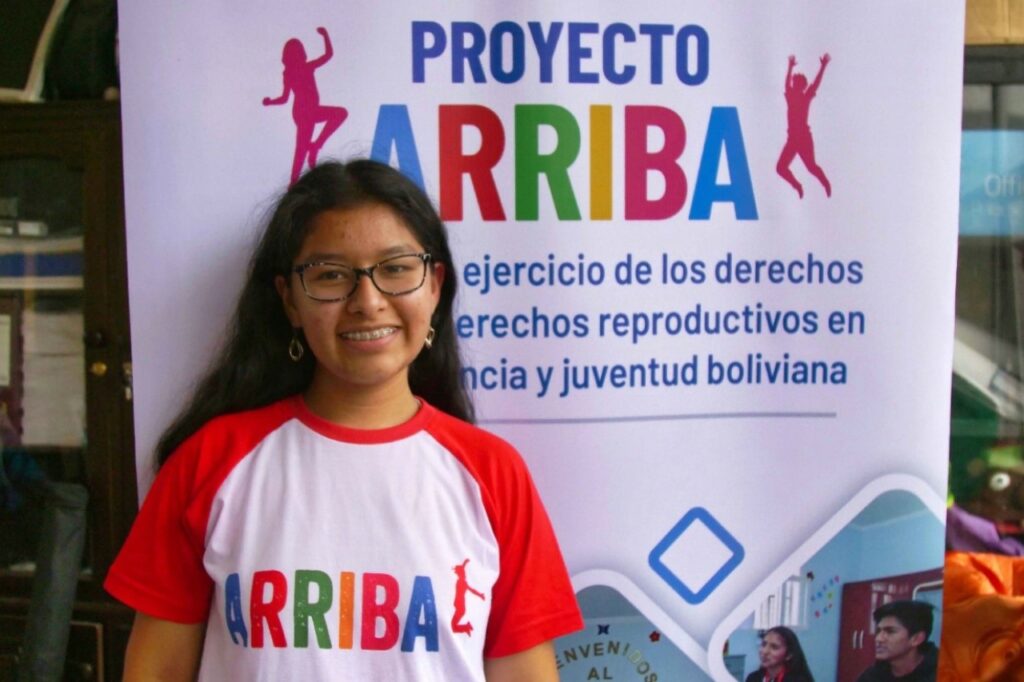When Fabiana is asked to recall one of the happiest moments of her life, she tells us it was the day she was sworn in as President of her municipality’s youth council. “I felt super important,” she says with her broadest smile.
It was September 2021, when she was only 16 years old and in the fifth grade of secondary school, that Fabiana took up the position of President as part of an initiative which encourages young people to take up leadership roles in decision-making spaces. Every school in her municipality in Bolivia’s Chuquisaca Department in the South American Andes can nominate one of their students to run for the youth council so there is a broad range of voices.
Fabiana’s leadership journey started when she joined the ARRIBA project run by Plan International. As one of 60 Champions of Change, Fabiana took part in various training sessions on advocacy and sexual and reproductive rights. The project aims to promote gender equality and challenge the social norms that hold girls back through activities led by children, adolescents and young people.
After developing new skills and building her confidence, Fabiana decided to join the Youth Network United for Gender Equality (JUPIG). Being part of the network helped Fabiana hone her leadership skills and provided her with a safe space where she could share her opinions without fear of being mocked or reprimanded.
“I felt safe and very confident. Sometimes in school, when someone is talking about something, there are others who make fun of them. That never happens here,” says Fabiana. “If you make a mistake, they don’t make fun of you. That’s what I like the most and it gave me the freedom to express myself with everyone.”

When she first joined the network, Fabiana admits that she was not very active but then she “launched herself to success,” she says amid laughter. In June of last year, she was elected to be President in the JUPIG Network elections which led to her nomination to be President of the Municipal Youth Council.
Fabiana says that after seeing her success, other young people in her community are more motivated to learn about advocacy and public management and want to follow in her footsteps. She gives the example of a tree planting initiative at the entrance to her town. This idea was launched and led by the JUPIG Network, but will soon involve all the schools in her community, through the district education authorities.
After almost five years of being part of Plan International’s projects, Fabiana expresses her appreciation for all the support that she has received. “Plan International gave us a lot of knowledge, which has led to leadership. Without them, perhaps our municipality would not have so many institutions that support us.”
Fabiana highlights, for example, the implementation of a Municipal Network for the Fight against Violence. “They always work in coordination with the municipal government office,” Fabiana explains about Plan International’s multidimensional work. She also highlights the organisation’s work with numerous facilitators, networks and partner agencies.
“There are many, many projects for adolescents and young people who do not have the same job opportunities. A friend of mine was telling me that she learnt how to raise farm animals. It’s very nice that Plan International has brought us so much knowledge.”
In Fabiana’s municipality there are two centres providing free, friendly, reliable and confidential sexual and reproductive health care for adolescents and young people. Fabiana is delighted that young person can come to these centres to not only discuss their contraceptive methods – but also menstruation and self-care.
This is a key aspect of the ARRIBA project, which addresses the barriers to adolescents’ need for reproductive and sexual health services. “It’s nice that everyone wants to talk about these topics,” says Fabiana. Recalling the mantras learnt at the project workshops she attended, she says: “I want and I can have a say when it comes to the body and sexuality.”
Fabiana often shares what she knows with family, friends and acquaintances, generating new ideas for the development of her community and municipality. With all her shared knowledge, the digital tools to spread her ideas (radio programmes and social media) and inspiring others to follow similar paths, Fabiana aims to be an example in her municipality, showing other regions what is possible to achieve.
She believes that an equal world is attainable and hopes to inspire other girls and adolescents to follow her lead. “Don’t give up,” she advises. “Sometimes they don’t want to pay attention to us, but there will always be people who will help you, who will encourage you.”
The ARRIBA Project is implemented by Plan International in Bolivia, with the financial support of the Canadian Government. It supports adolescents and youth to gain awareness of their sexual and reproductive rights in order to make informed decisions, and it promotes the prevention of adolescent pregnancy as well as the reduction of maternal and neonatal mortality. The ARRIBA Project also works to eliminate gender-based violence and promotes equality.
The project addresses barriers to adolescents’ need for reproductive and sexual health services, challenges in the provision of such services and community and institutional level governance and accountability. Plan International works with CIES (Bolivian NGO) to implement the project in 12 municipalities in the departments of La Paz, Cochabamba, Chuquisaca and Tarija.